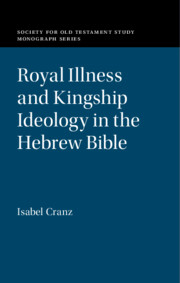Book contents
- Royal Illness and Kingship Ideology in the Hebrew Bible
- Society for old Testament Study Monograph Series
- Royal Illness and Kingship Ideology in the Hebrew Bible
- Copyright page
- Contents
- Acknowledgments
- Abbreviations
- Introduction
- Part I The Failure of Kingship and the Demise of the Nation
- Part II Flawed Personalities and Divine Judgment
- 4 Jehoram Spills His Guts (Literally)
- 5 Royal Illness and Self-Reliance
- 6 Royal Illness and Arrogance
- Conclusion
- Bibliography
- Subject Index
- Source Index
- Author Index
4 - Jehoram Spills His Guts (Literally)
The Embodiment of Retribution and the Davidic Covenant in 2 Chr 21
from Part II - Flawed Personalities and Divine Judgment
Published online by Cambridge University Press: 19 November 2020
- Royal Illness and Kingship Ideology in the Hebrew Bible
- Society for old Testament Study Monograph Series
- Royal Illness and Kingship Ideology in the Hebrew Bible
- Copyright page
- Contents
- Acknowledgments
- Abbreviations
- Introduction
- Part I The Failure of Kingship and the Demise of the Nation
- Part II Flawed Personalities and Divine Judgment
- 4 Jehoram Spills His Guts (Literally)
- 5 Royal Illness and Self-Reliance
- 6 Royal Illness and Arrogance
- Conclusion
- Bibliography
- Subject Index
- Source Index
- Author Index
Summary
This chapter deals with Jehoram of Judah, who suffered from a painful bowel disorder. Jehoram’s disorder is framed by a series of cultic and moral offenses which necessitate a drastic divine judgment. To shed additional light on the Chronicler’s framing of Jehoram’s illness, this chapter considers Jehoram’s place within the broader context of the Chronistic history and the Davidic kings featured therein. The framing of Jehoram’s illness plays out on two levels. On one level, Jehoram’s illness is linked to the wider context of Judah’s eventual destruction. On a second level, Jehoram’s illness is part of a complex literary framework which presents Jehoram as a quasi-Omride king and marks his reign as a new low point in the Chronistic reconstruction of Judahite history.
- Type
- Chapter
- Information
- Royal Illness and Kingship Ideology in the Hebrew Bible , pp. 119 - 140Publisher: Cambridge University PressPrint publication year: 2020

